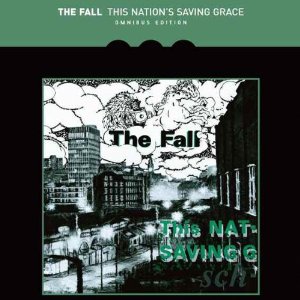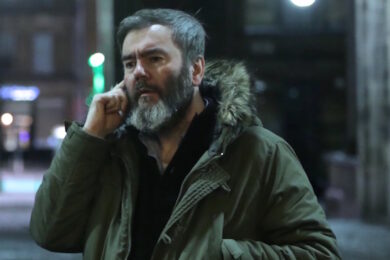With bonus discs and a colour booklet, the omnibus edition of This Nation’s Saving Grace is a beautiful package and, as with the recent Wonderful and Frightening World box set, is set to fly from Amazon, no doubt to be careful placed on sagging shelves of middle-aged men in Hartlepool. Beggars Banquet is to be commended, for this sumptuous slice of essential Fall history retails at a mere £16.99. If one is foolish enough, you could pay that for a single album alone. But then… there remains the nagging nature of that irony. Isn’t…wasn’t the very point of The Fall a move away from such carefully constructed overviews? To capture the feel of any given moment, any given line-up, any given vision, be it musical, lyrical or graphic? That is The Fall essence. Snap it, record it, keep it. For better or worse. Then move on.
What would the restless Smith of 1985 make of such an artefact? Particularly as TNSG arrived effectively as a ‘slap back’ album; a typically stubborn and concerted attempt to allay fears that Beggars Banquet had succeeded in softening the band’s caustic edge. The influence of Brix had undoubtedly added unlikely poptones…as a number of the recordings that preceded this album – ‘No Bulbs’, ‘Oh Brother’, ‘Couldn’t Get Ahead’ – seemed to indicate. As if aware of this, Smith steered the band into rougher seas. TNSG was, therefore, constructed in an atmosphere of defiance.
While taking that on board, there is little doubt that the album is one of the peak achievements of this or any other version of The Fall. Arriving on the heels of The Wonderful and Frightening World, it caught a band on a roll from a city on the brink of resurgence. The band seemed a perfect blend of old and new, with the nucleus of Craig Scanlon (rhythm guitar), Steve Hanley (bass) and drummer Karl Burns cementing longevity freshened by the poptones and vision of Mark’s wife, Brix and, curiously, classical music graduate Simon Rogers. The balance suited the band’s heavy gig schedule in a frenetic year. Back in Manchester, the rush of new bands – Easterhouse, James, Simply Red, Jazz Defekters, Kalima, Marc Riley and the Creepers etc – served to shunt Manchester’s big three – Smiths, New Order, The Fall – to an even higher profile. One recalls this year, and for the first time, a jack-booted Mark E Smith enjoying a headline slot at the city’s Free Trade Hall; something that would have been unthinkable just 12 moths previously.
All of which injected a certain optimism amongst the ranks. Despite that inkling of commercial success, life with Beggar’s Banquet seemed unusually settled for this most fractious of units. Mark and Brix had moved into a semi-detached house in Salford’s Sedgeley Park, literally a stone’s throw away from the identical house in which he grew up. This move seemed to add a certain stability and is celebrated on this album with, naturally enough, ‘My New House’, which only proved that Fall songs could be about ‘anything’. The house was/is actually curious in itself. With a blue/grey décor throughout, it clashed markedly against the prevailing trends and always seemed the perfect manifestation of Mark and his lively muse.
The Nation’s Saving Grace begins with what has become an evergreen Fall live set opener. Brix Smith’s ‘Mansion’ is a dark, catchy dabbling in pyschedelia and the absolute perfect lead-in to Mark’s gloriously defiant ‘Bombast’. If ever a song laid down a statement of unbridled vitriol, this is it. Good too, to hear the full funky force of Steve Hanley – one of the most underrated musicians of The Fall’s vast army of ex-members. There is a version of ‘Bombast’ on the second CD here, sitting amid a rather uneven collection of outtakes, demos and rough mixes, that sees Hanley’s strike up a gear and move to the front of an already raucous noise. Smith would staunchly defend Hanley at the time, stating; "No musician can LEARN what Steven does. You cannot TEACH someone that sound. You have to feel it and no other musician I have worked with has done that." This rare tribute to a long-standing band member came at the time of TNSG and it is on this box set, particularly among the supporting collection of also-ran mixes, that Hanley begins to particularly shine. How strange then to note a certain subduing of the bass lines on the official release. This has never been apparent until now.
Of course, band politics have always been deeply and intriguingly engrained within The Fall sound. Both this box set and the preceding Wonderful and Frightening World do offer a glimpse into this controlling process. It is not always comfortable, either. I know of a at least two ex members who still seethe at the memory of hearing their diminished contributions when confronted with the final mix. It’s a Fall thing. This may be particularly apparent on TNSG as there was a curious dynamic between Smith and producer John Leckie. Smith’s nervousness in regard to the musicality of Simon Rogers here is a case in point. "You have to UNLEARN your music" he told Rogers at the time, although one senses that Leckie would cleverly counter that particular notion. This is the core of the dynamic: the force of Brix’s pop sensibility and the clean nature of Leckie versus the growl of Hanley and Smith’s ever-present belligerence. Put this unlikely sparring together with 11 of Smith’s barbed statements, and it is no surprise to find this ranking among the band’s finest moments, for there is a curious ‘haunting’ to the sound that wasn’t apparent on The Wonderful and Frightening…
Nowhere is this more apparent than on ‘I Am Damo Suzuki’, Smith’s genuine tribute to the Can vocalist he had befriended. The song is loosely based on Can’s ‘Oh Yeah’, which had even been mooted in a Fall practice session at the time. But it’s an affectionate nod – not too many of those in the Fall’s vast canon – rather than a steal. One can also sense the Germanic influence in ‘Paintwork’. A semi-acoustic drifting that touches a mild psychedelic. Rather lovely and lonely when placed in a song list that also includes ‘Spoilt Victorian Child’, ‘Gut of the Quantifier’ and ‘L.A’. The latter being a rather testy look back to the lengthy period Smith had spent in the city. "Hated LA," he told me, "…and I spent six months there…and in the best bits as well. It’s horrible. Horrible town. If you like a beer, you are regarded as a tramp. Hated it." As such, the track, ‘L.A’ might convey the rather obvious message that the city of angels is not the most natural home for a belligerent Salfordian who enjoyed the nicotine stained lounge-bars in pubs near Heaton Park than the bistros of West Hollywood.
I am not convinced that all Fall albums would be enhanced by an Omnibus version. However, TNSG does find the band at the centre of a frenetic year… and that entire year does seem to be beautifully gathered here. It seems curiously evocative of the time, to be flicking through the superb accompanying booklet while allowing the album and multitudinous out-takes to fill the room. The sound of a band battling the natural slide towards a central sound. The sound and feel also, of a band, bunkering back in Manchester and Salford, as if unsettled by the broadsheet acceptance that had started to surround them.




